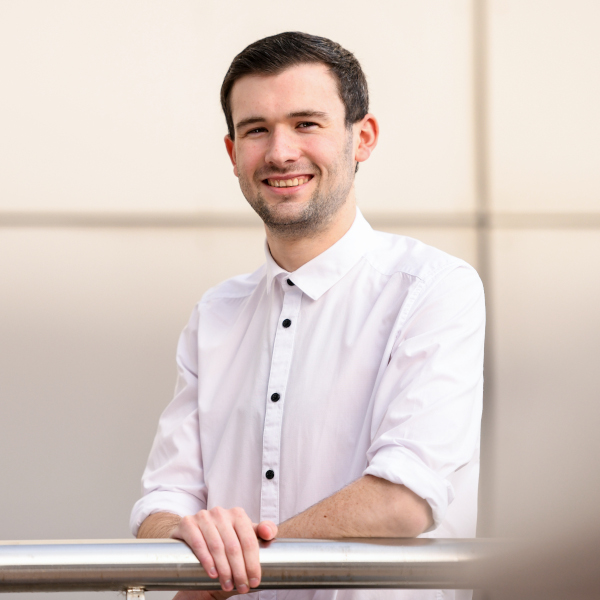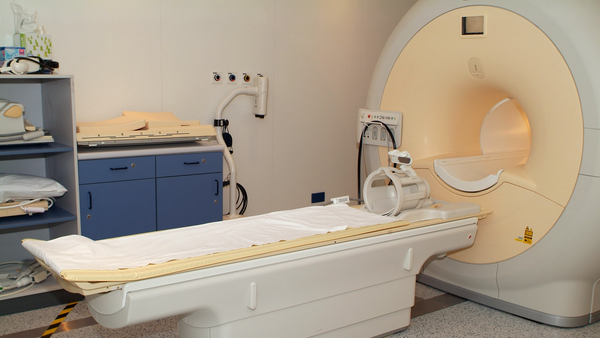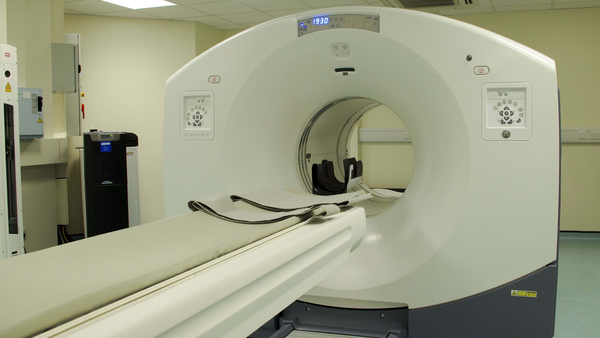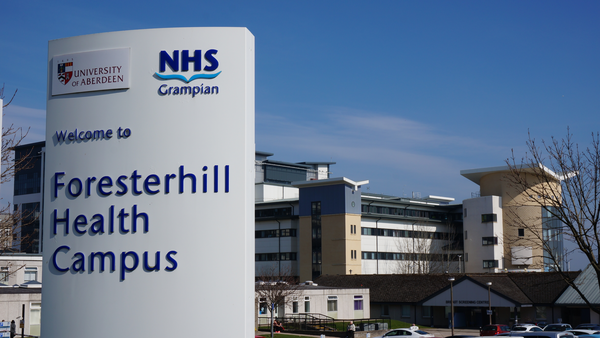Aidan Mackenzie

Our MSc in Medical Physics will improve your knowledge of how technology can help diagnose disease, while you learn about all the major aspects of physics as applied in the modern clinical/health environment. The programme is delivered in partnership with NHS Grampian.
The University of Aberdeen has an internationally renowned reputation and an enviable history in developing new techniques for medical imaging, including being the first place in the world to build a whole-body sized Magnetic Resonance Imaging (MRI) scanner and conduct a diagnostic MRI scan.
On this MSc programme you will study such specialisms as nuclear medicine (which includes learning about diagnosing disease using radioactive tracers), radiotherapy, medical electronics and MRI. The programme is aimed at individuals who want to obtain an MSc from a top tier UK University. Applicants typically include recent physics and engineering graduates, people who are on the NHS Medical Physicists training programme and those in employment as medical physicists and radiologists.
This programme is available to start in September or January.
The Medical Physics programme covers the full range of applications of physics to healthcare, including diagnostic imaging and radiotherapy. The curriculum is based on the requirements of the National Health Service (NHS) in the UK and the programme is accredited by the Institute of Physics and Engineering in Medicine (IPEM).
| Fee category | Cost |
|---|---|
| EU / International students | £23,800 |
| Tuition Fees for 2024/25 Academic Year | |
| UK | £11,100 |
| Tuition Fees for 2024/25 Academic Year |
We will endeavour to make all course options available. However, these may be subject to change - see our Student Terms and Conditions page.
Self-funded international students enrolling on postgraduate taught (PGT) programmes will receive one of our Aberdeen Global Scholarships, ranging from £3,000 to £8,000, depending on your domicile country. Learn more about the Aberdeen Global Scholarships here.
To see our full range of scholarships, visit our Funding Database.
Our Medical Physics programme is taught through traditional lectures and practicals with some courses making use of seminars and specialised practical sessions. Many lectures are recorded and can be viewed again by students when required.
The MSc enables you to learn outside the classroom in our state-of-the-art facilities, including MRI scanners, the John Mallard Scottish PET Centre and the recently opened radiotherapy centre. This will enable you to apply both theory and practice to medical physics projects. You will also have many opportunities to engage with staff from the School of Medicine, Medical Sciences and Nutrition and Foresterhill Health Campus, one of the largest clinical complexes in Europe.
Some of the teaching methods employed in the programme include:
On-going support is provided by the University’s dedicated team of experienced researchers, who will be tutoring you.
Much of the teaching on this course involves participatory research work. Students are expected to engage with research work as well as classroom teaching and independent study in their own time.
Students are evaluated through continuous assessment in the form of essays, laboratory practicals, individual and group presentations and written examinations. The MSc project is assessed by a thesis and oral presentations of the project findings.
Each course throughout the programme is assessed by continuous assessment in the form of practical write-ups, essay assignments, student presentations and written examinations.
The information below is provided as a guide only and does not guarantee entry to the University of Aberdeen.
Physical science or Engineering second-class Honours degree. Minimum 2:2, 60% or GPA 2.4/4 or 3.0/5 overall.
Please check the In My Country pages to find out if your degree is equivalent.
Academic Technology Approval Scheme (ATAS) certificate
The CAH3 code for this degree is CAH07-01-01. Students who need a visa to live or study in the UK must to apply for ATAS clearance. The ATAS clearance certificate must be valid when you apply for a visa to enter the UK. To find out if you need to apply for ATAS clearance, please visit http://www.gov.uk/guidance/academic-technology-approval-scheme
Please enter your country to view country-specific entry requirements.
To study for a Postgraduate Taught degree at the University of Aberdeen it is essential that you can speak, understand, read, and write English fluently. The minimum requirements for this degree are as follows:
IELTS Academic:
OVERALL - 6.5 with: Listening - 5.5; Reading - 6.0; Speaking - 5.5; Writing - 6.0
TOEFL iBT:
OVERALL - 90 with: Listening - 17; Reading - 21; Speaking - 20; Writing - 21
PTE Academic:
OVERALL - 62 with: Listening - 59; Reading - 59; Speaking - 59; Writing - 59
Cambridge English B2 First, C1 Advanced or C2 Proficiency:
OVERALL - 176 with: Listening - 162; Reading - 169; Speaking - 162; Writing - 169
Read more about specific English Language requirements here.
You will be required to supply the following documentation with your application as proof you meet the entry requirements of this degree programme. If you have not yet completed your current programme of study, then you can still apply and you can provide your Degree Certificate at a later date.
Eligible self-funded postgraduate taught (PGT) students will receive the Aberdeen Global Scholarship. Explore our Global Scholarships, including eligibility details, on our dedicated page.
Aberdeen Global ScholarshipsCompleting the MSc programme in Medical Physics at the University of Aberdeen will provide you with a solid base to pursue a career in healthcare and science, within hospitals, academic institutions and industry. You will develop the knowledge, understanding and practical insight that will enable you to help diagnose and treat disease using techniques such as nuclear medicine, MRI, medical electronics and computer technology and radiotherapy.
Some of the career options available to you include:
An MSc in Medical Physics from the University of Aberdeen will show employers that you have a broad knowledge base, first-hand research experience and the relevant skills required to bring value to their organisation. Links with the University, the John Mallard Scottish PET Centre and the Foresterhill Health Campus will enhance your credibility and help establish your reputation as a contributor to essential research projects.
The MSc programme meets the educational requirements of the Part I Training Scheme for Medical Physicists and Clinical Engineers in the UK’s National Health Service.
NHS Grampian
GE Healthcare
Philips Healthcare
Siemens Healthcare

The programme will be delivered by an experienced, multidisciplinary team of internationally renowned researchers and NHS staff.
You will be taught by a range of experts including professors, lecturers, teaching fellows and postgraduate tutors. However, these may be subject to change - see our Student Terms and Conditions page.

Our 3.0 T Philips Achieva research MRI scanner, is located in the Lilian Sutton Building (LSB) at Aberdeen Royal Infirmary (ARI) on the Foresterhill Health Campus.

The clinical PET scanner (a GE Discovery STe PET CT) is located in a purpose built facility, adjacent to the tracer development facility, nuclear medicine and MRI units.

The Foresterhill Health Campus is one of the largest clinical complexes in Europe which includes the Medical School, large teaching hospital, the Institute of Medical Sciences and the Rowett Institute.